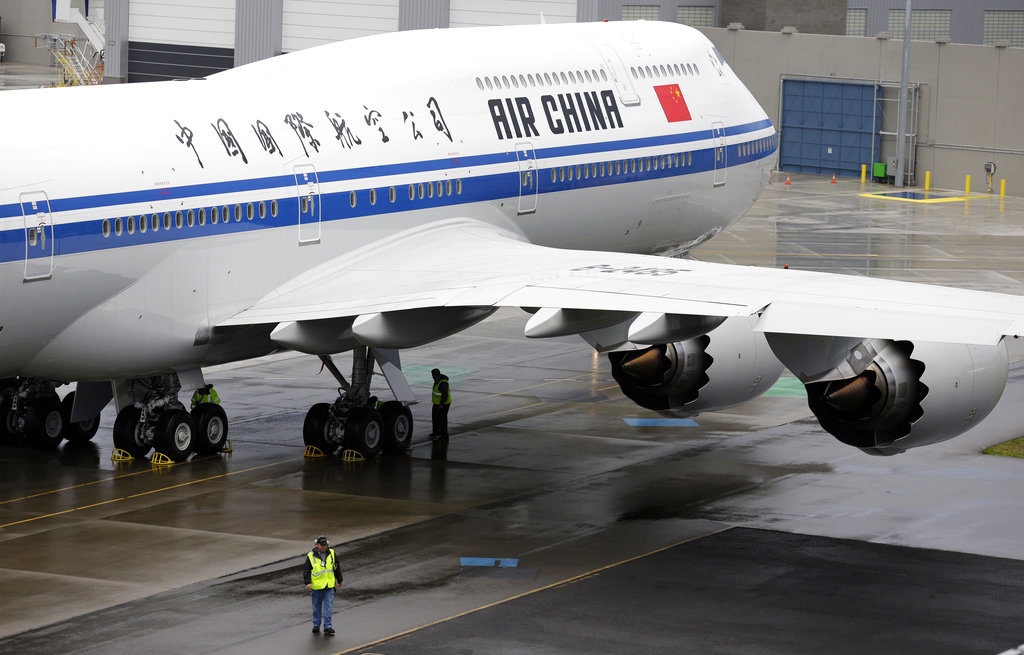US and China both omit key products from tariff threats

In this Sept. 29, 2014, file photo, a worker in Everett, Washington, walks next to the first Boeing 747-8 Intercontinental airplane to be delivered to Air China. In their escalating conflict over trade, what the U.S. and China are leaving off their tariff lists tells as much as what’s on the lists. China put smaller planes on its list, but excluded the 747 and other big planes made in the U.S. by Boeing Co. AP
DETROIT, United States — Americans spent nearly $96 billion last year on cellphones and computers imported from China, far more than on any other items. But you won’t find them on the list of Chinese-made products the Trump administration is threatening with tariffs.
And China spends about $1 billion a year importing animal hides from the U.S. to make shoes, car interiors and furniture upholstery. But China didn’t include those on its own list of threatened tariffs.
In their escalating conflict over trade, what the U.S. and China are leaving off their tariff lists tells as much as what’s on them. The U.S. would put tariffs on flat-screen televisions, for example, but not on clothes. China threatens tariffs on U.S. whiskey but not beer. The omissions indicate how far both countries might be willing to go, or what they could use as future bargaining chips.
The threats intensified last week, when the Trump administration released its list of imports from China worth $50 billion on which it would impose 25-percent tariffs as punishment for China’s alleged theft of U.S. intellectual property. China retaliated with its own threatened tariffs on $50 billion worth of U.S. products.
The tariffs are far from a done deal. The U.S. proposal is subject to a public comment period, and both countries’ lists could still shrink or grow. On Thursday, for example, Trump directed the Office of the U.S. Trade Representative to consider $100 billion in additional tariffs.
Article continues after this advertisementSo far, neither country is targeting products they would have a hard time getting elsewhere. China has U.S. soybeans on its list because it can easily buy them from other countries like Brazil. But Brazilian animal hides aren’t as prized as U.S. ones, since U.S. winters made animal hides thicker and more resistant to bugs, says Stephen Sothmann of the U.S. Hide, Skin and Leather Association.
Article continues after this advertisementThe U.S. is the top supplier of animal hides and skins to China’s $220 billion leather industry. China exported 680 million pairs of leather shoes last year, according to the Chinese Leather Industry Association.
The U.S. list excludes laptop computers because they’d also be hard to get from somewhere else. China currently supplies at least 70 percent of laptops, said William Reinsch, a senior adviser with the Center for Strategic and International Studies, a think tank.
Both countries also have their own business interests in mind.
Most Apple Inc. iPhones are assembled in China, but they have parts from all over the world, like batteries from Korea or screens from Japan. China contributes the labor to put it all together, but that’s only around 1 percent of the cost of a $500 iPhone, Reinsch said.
“It seems that the U.S. trade representative was very much aware of the global value chains in keeping some of these items off the list,” said Dean Pinkert, a trade lawyer and former commissioner of the U.S. International Trade Commission.
China put smaller planes on its list but excluded the 747 and other big planes made in the U.S. by Boeing Co. China’s own planes are still years behind foreign competitors, and it would be difficult for Chinese airlines to quickly find replacement jets. Still, China could use bigger planes as a bargaining chip in future negotiations.
In some cases, things were left out because they’re small change. China is targeting U.S. whiskey and wine, for example, but not beer. That’s because relatively little beer is exported out of the U.S., said Bart Watson, chief economist for the Brewers Association, a lobbying group for craft brewers. The U.S. doesn’t target its minuscule imports of animal hides from China, but it is threatening to put tariffs on machinery used to tan leather or make shoes.
U.S. and Chinese also have some different reasons for what they included and excluded from their lists.
China had an eye on U.S. politics, Reinsch said. Soybeans come from Midwest states like Iowa, which voted for President Donald Trump in 2016 but might not again if he threatens farmers’ livelihoods.
“The Chinese are predictable. They will do it in a way that will maximize the political pain here and minimize the cost to them,” Reinsch said.
Trump on Monday said he’s going to “make it up” to farmers who would be impacted by China’s proposed retaliatory tariffs on U.S. exports.
“It’s not nice when they hit the farmers specifically because they think that hits me,” he said.
The U.S. said its tariffs were designed to cause as little disruption as possible to U.S. consumers. That’s why cellphones aren’t on the list, as well as clothing, shoes, toys, games and furniture, even though they’re top imports from China.
But Mary Lovely, an economics professor at Syracuse University and a fellow at the Peterson Institute for International Economics, said it’s impossible to protect American consumers and put maximum pressure on China at the same time. Most high-value goods exported from China have foreign content, so U.S. and foreign companies will wind up footing the bill.
She thinks the U.S. should consider non-tariff measures, like forbidding U.S. companies from working with Chinese companies that have stolen tech secrets.
“China is not going to stay the world’s factory and workshop, so how can we exert pressure to get them to play fairly,” she said. /cbb